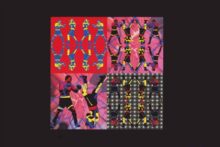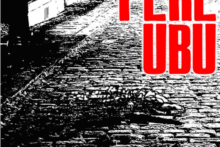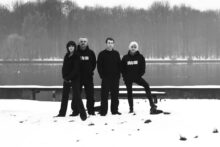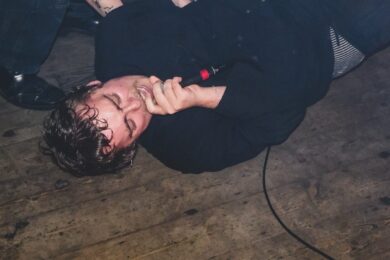With their chaotic live shows and songs that meld traditional instrumentation with the electric energy of The Fall, London-based MPTL Microplastics have been described as anti-folk – but they have a better descriptor for their sound. “Pere Ubu went by ‘industrial folk’ for a bit, but I feel like we’ve got a better claim to that,” says singer and lyricist Joey Hollis. “We’ve got a cello and a mandola – they just had guitars!”
Named after a twist on a lyric from Lana Del Rey’s ‘Cola’ – their name in full is My Pussy Tastes Like Microplastics – the band have a distinct tradition-meets-futurism aesthetic, and a mix of what Hollis calls “some real erudite musicianship, and some slightly amateur energy”. Onstage at their already legendary gigs, you’ll see classically-trained cellist Alex Duncalf next to Leo Peace thwacking a beer keg, and Isabella Shannon on The Pipe, a SOMA Labs synth that transforms the voice into electronic sound. “There’s not enough future in folk music,” says guitarist Dan Powley, explaining the band’s approach. “We love the tradition of it, but it’s important to have elements that you haven’t heard before.”
The band played their first show in 2023, when Powley suggested Hollis apply his established poetry practice to music. They have since grown to an eight-piece, including mandola, synth and guitar player Amelia Blackwell, who joined after moving into a sublet with Powley in London. “Joey put it once as me falling into their lives via Spareroom,” says Blackwell. “The music was so all over the place, but very sincere and raw. It felt really good to be a part of.” Hollis and Blackwell now work closely as primary lyric and music writers. Coming from a poetry background, Hollis doesn’t always deliver lyrics that are readily song-shaped: “I always think I’ve written something really regular, then I bring it into the practice space and realize all the bits that are sticking out.”
Released via their own micro-label Infrared in November 2024, the band’s debut single “Plastic Princess” arrives in a familiar song-shape, halfway between a queasy sea-shanty and a folk ballad, before gradually allowing strangeness to overtake it. In this way, it’s analogous to the garden of Derek Jarman, who it is a tribute to – its noises and voices blooming and multiplying into a cacophony like the flowers the artist planted at Prospect Cottage, in the shadow of a power station at Dungeness, Kent.
“It’s in such a bleak landscape,” says Hollis of visiting Jarman’s garden. “There’s a feeling of it being the end of the world both spatially and temporally. But also, of it being a place where you need to make your beginning. A lot of my writing has been about struggles of health and having a body. I feel a real affinity with the last period of Jarman’s work, the sense of dilated urgency that comes with ill health, and the need to make meaning of how the body fails.” Hollis’ Dungeness visit has led to him becoming “a new type of tourist” – he has just got back from nuclear power station Sizewell B in Suffolk. “It looks like an atomic mosque,” he says. “People go there to swim on the beach as well. Completely bizarre. There might be something about Sizewell soon. I think [the band] is a lot about turning Southern Gothic into Surrey Gothic, or Home Counties Gothic.”
Aside from Jarman, the group’s influences range from folk to noise rock, technical metal to Can. Released in January 2025, their second single “sex/pol” is reminiscent of mid-90s The Fall, a conscious inspiration for their use of repetition as strategy – what Powley defines as, “not necessarily repetition in a modernist way that imbues it with meaning, but brute force repetition until something emerges.” Here, the inherent violence and tension in Microplastics’ sound is close to the surface, and Blackwell sees the band members’ conflicting individual tastes as essential to it. “It can make for a chaotic song,” she says. “We sometimes hate what each other listens to and I think that does set us apart from most bands.”

Due for release in May, Microplastics’ next release consists of two songs, “Wound Nurse” and ”No More Dying”, which both see the band build on eerie atmospherics and warped songcraft. Propelled by a beat that threatens to collapse at any moment, “No More Dying” is haunted by a Throbbing Gristle-esque breakdown of screams and ghostly electric shocks. “We stole the drum beat from “Cenotaph” by This Heat,” says Blackwell. “We did a cover of it and it made a lot of things click for us.” The song’s lyrics are a reflection on Hollis’ experience in custody after a recent action protesting the arms trade amidst the ongoing genocide in Gaza. “If you want to find out about masculinity, go through custody and see the sadism that exists in our justice system,” says Hollis of his experience. “If you’re desperately trying to step out of a cycle of dehumanisation, and then you actually spend time with steroided-up policemen – actually having to try and account for their humanity and not reduce them to pigs, that’s agonising. The song is an attempt at a sort of militant eulogy.” Hollis adds that being diabetic and denied medicine while held on remand played a large part in the song’s writing.
Hollis’ relationship with disability also led to the writing of “Wound Nurse”, which takes equal inspiration from a nurse-turned-photojournalist colleague (“he claimed to have reinvented the nude within the context of the hospital”) with the video work of Stephen Dwoskin, a disabled filmmaker who juxtaposed footage of intensive care units with imagery of himself engaged in BDSM rituals. “It’s that idea of the latent eroticism in the experience of health and care,” says Hollis. “What happens when you bring that to the foreground? What new layer of meaning is underneath?” As with all the band’s singles so far, Hollis’ sister Holly has created a painting to accompany the release, a Jenny Saville-esque close-up that evokes the same kind of fleshy disgust/eroticism as the song.
The band are keen to continue developing in twin directions: concurrently pushing the wild physicality of their live shows and the future-forward potential of their recordings. Powley emphasises their interest in studio manipulation, assisted by an ongoing collaboration with producer Armando Gonzalez Sosto. “The dream is to have some kind of studio set-up, or do what Royal Trux did when they robbed Virgin then made their own studio,” laughs Powley. “That’s the eventual goal: someone to rob.”

As for live shows, they want to keep the potential for variation and improvisation in certain songs – including by their growing audience. “We love having people whacking our percussion kit, coming up on stage and getting involved,” adds Powley. “We’re keen to make it a physical and participatory kind of thing, which you just can’t do with a song.”
“We want to make our live shows an experience of violence,” concludes Amelia. “But we have a no fighting near the cellist rule.”
“Wound Nurse”/”No More Dying” will be released via Infrared Records in May 2025. MPTL Microplastics play Acid Horse at The Barge Inn in Wiltshire, 23-25 May 2025








